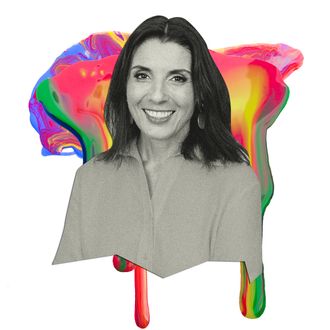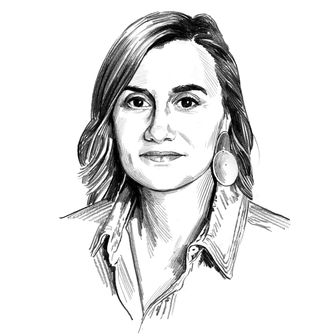
Lulu Garcia-Navarro isn’t interested in hot takes. On her podcast for the New York Times, First Person (returning this fall), the two-time Peabody Award winner explores the personal stories behind people’s beliefs, including a man who has devoted his life to fighting for parental rights and a mother who wishes abortion had been an option for her. Opinion journalism is a new challenge for the former host of NPR’s Weekend Edition, who spent more than a decade as a foreign correspondent for the public broadcaster, producing award-winning coverage of the Arab Spring uprisings, the Iraq war and Mexican asylum seekers. The one constant throughout Garcia-Navarro’s dynamic career is that she’s always moved toward the uncomfortable, whether that means putting herself in physical danger, learning a new craft at 51, or speaking publicly about her struggles with PTSD and depression. The Miami-raised journalist spoke with the Cut about where all that energy comes from and why older women shouldn’t be afraid to embrace professional change. She lives in Washington, D.C., with her 9-year-old daughter, husband, and two dogs. Here, Garcia-Navarro shares how she gets it done.
On her sleep habits:
I’ve always been a morning person who can get up as early as 5:30. Right now, I’m waking up in the middle of the night because I’m going through menopause, I think. We don’t talk enough about the changes that happen in women’s bodies. I’ve been having hot flashes. It’s hard because, physically, I have this kind of flushing sensation I can’t quite control. There’s something about being up in those early hours that makes things seem worse. I can start to feel incredibly anxious at night, and my mind can start worrying. Then I wake up the next morning and feel like, Oh, no, that’s fine. I’ve been dealing with it by going to sleep early, sometimes at 9 p.m. I take melatonin, which works really well for me. It doesn’t feel like I’ve completely lost the plot.
On ageism:
After taking the Times job last fall, I had people tell me, “Man, you’re doing that at your age? That’s really brave.” There is a real push for women to be eternally youthful, especially in the workplace. After 50, we’re let go at higher rates than men, and the problem is even worse for women of color. It feels like there’s an expiration date, that somehow your fertility and your viability as a working person are interconnected. I think that’s bullshit. There’s a complicity of silence around aging and menopause. We feel like if we dye our hair and get Botox that we can somehow evade these biases that are built into our system. I’ve always been the kind of person who speaks about the uncomfortable things and goes to the places where people don’t want to go. I think that’s the only way that you can move the needle.
On change:
I’ve always been peripatetic, and I get bored easily. I never chose the easy path, for reasons you, me, my therapist, and my mother would like to understand. My father died when I was 5, and I come from a family of Cuban exiles. I inherited a sense that life is never certain no matter how you try to insulate yourself. Moving around is essential to my nature, but I would also argue that we are our own cages. I’m not disputing all the institutional and social challenges that people face. But when I start to feel like, Oh my God, I’m feeling stale, that’s a challenge to go do something else. It’s scary, especially when you’ve got a kid, which I do, and people depend on you. I was struggling with my mental health during the pandemic and knew I had to make a change. I thought, I have three options: I can change my house, I can change my marriage — which my husband didn’t think was a great idea — or I can change my job. And that’s when this amazing opportunity came along.
On the healing power of pets:
I got my first dog as an adult, when I was recovering from post-traumatic-stress disorder as a conflict reporter. They look at you with love and need, and it became a really important form of connection for me. You touch them and feel endorphins. During the pandemic, two of my dogs died — one in my young daughter’s arms. We decided to replace them since it was the depths of winter and we weren’t doing much. We actually got Labradoodles, like everybody else in the world, named Milo and Lola. They were puppies and pooed everywhere. They continue to destroy my house. Lola peed on my sofa just this morning. But they are saviors in a lot of ways. As things started to open up again, I found it difficult to get back to the rhythms of what had come before the pandemic. I started getting very, very depressed in a way I hadn’t been before. I was waking up in the morning and wondering whether it was actually even worth getting out of bed. The dogs gave me a sense of momentum and purpose on those monotonous days.
On ambition:
After hosting the Sunday Edition for five years, I wanted my weekends back. Does that mean I’m less ambitious? Does that mean I’m somehow taking a backseat in my career? No. I’m recalibrating it so that my job suits me better. I’ve learned a lot through friends who might not have jobs they love but who have built really rich lives. I find that to be incredibly inspiring, because I lived in war zones for so long and didn’t have much life outside of the job that I really loved doing. Now that’s changed. I’m not just thinking about where I am on my ambition meter. I think, Who loves me in this world? What things am I exploring? How am I nourishing myself?
On the need for disagreement:
In this political moment, when we are so divided and hiding in our own corners, I want to give people the space to explain their reality. The intention with my show isn’t that you would come away thinking, Maybe now I do love that Joe Biden or Maybe Trump is okay. My hope is that you would come away from it understanding someone’s humanity, their motivations, and why they believe what they do. We can’t really understand the forces that are shaping our world without engaging in opinions we don’t agree with. I’m a Latina in this country, and it’s been hard to interview people who fundamentally believe that I should go back to my country or who question my very right to exist. I’ve interviewed extremists who have wanted to kill me. But when I’m talking to someone, there is always a clear, important reason. If you’re only interviewing one side of a conflict, you’re not going to understand it. And if I only interviewed people with whom I agree, it would be a pretty boring career.
On advocating for herself and others:
I’ve always been a pain in the ass. But I do feel that it’s important, especially when you have some modicum of power, to make things better for the people who are coming after you. After a friend from the Times of London interviewed me about my PTSD, I thought, It’s actually really important to talk about. I can’t be a journalist in this world and ask people to talk about things that are painful or uncomfortable without having the courage myself to do it. Speaking about things like mental health or diversity issues at work, as I did at NPR, exposes you to judgment. I don’t think that everyone needs to do it. But that’s been my moral compass. It’s much easier to advocate for yourself with a group than alone. I had a lot of allies and friends at NPR who helped me, including white male hosts. I have found friendship and support in unlikely places.





